|
|
|
Sort Order |
|
|
|
Items / Page
|
|
|
|
|
|
|
| Srl | Item |
| 1 |
ID:
125600
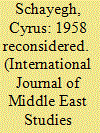

|
|
|
|
|
| Publication |
2013.
|
| Summary/Abstract |
Using Arabic, English, and French sources, and engaging Middle East and Cold War historians, this article makes a threefold argument. First, in United Arab Republic (UAR)-Syria, Jordan, and Lebanon, the 1958-59 explosion of domestic and regional tensions triggered state-formation surges. Second, these formed one process, which made those states more alike, with state-led socioeconomic planning playing a key role. Third, that process partook of a global Third World trend intersecting with the early Cold War. I draw three conclusions. Although existing scholarly readings that the events of 1958-59 in the Arab Middle East formed a crisis but not an ideological or political watershed are correct, from the viewpoint of state formation this crisis was a milestone. Moreover, UAR-Syria, Jordan, and Lebanon had persisting affinities and shared regional positions-notably, the fact that all were sandwiched between the unstable poles of the Arab state system, Iraq and Egypt-that shaped their individual postindependence histories of state formation. Last, Washington's low-profile involvement in this state-formation surge illustrates how domestic sociopolitics and regional geopolitics-including the UAR's peaking popularity and influence in 1958-59-affected U.S. policy in the Cold War postcolonial world.
|
|
|
|
|
|
|
|
|
|
|
|
|
|
|
|
| 2 |
ID:
112280
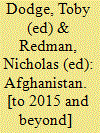

|
|
|
|
|
| Publication |
Oxon, International Institute for Strategic Studies, 2011.
|
| Description |
299p.
|
| Series |
Adelphi Series No. 425-26
|
| Standard Number |
9780415696425
|
|
|
|
|
|
|
|
|
|
|
|
Copies: C:1/I:0,R:0,Q:0
Circulation
| Accession# | Call# | Current Location | Status | Policy | Location |
| 056419 | 958.1047/DOD 056419 | Main | On Shelf | General | |
|
|
|
|
| 3 |
ID:
113595


|
|
|
| 4 |
ID:
138683


|
|
|
| 5 |
ID:
135542
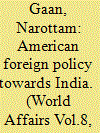

|
|
|
|
|
| Summary/Abstract |
This article contracts the American/Western judeo-Christian culture and its definition of the world with the traditional Asian/Eastern Indic perspective to explain major features of US policy towards developing countries in general and India in particular. American diplomacy so far has been dictated by the national belief in the superiority of biblical monotheism and US outreach is associated with the spread of judeo-christinity and the defeat of “paganism”. In the name of protecting religious freedom, the American government claims the right to monitor the status of religion in other countries and support Christian missionary organizations. This policy is also a tool to keep India and other countries in a subordinate role by expanding US influence in all field.
|
|
|
|
|
|
|
|
|
|
|
|
|
|
|
|
| 6 |
ID:
175768
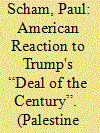

|
|
|
|
|
| Summary/Abstract |
As I write this in mid-March of 2020, events, priorities and attitudes are changing at a dizzying speed. Everything is eclipsed by fear and apprehension regarding the coronavirus. Even before the virus took front and center, the rapid reversal in the political fortunes of Bernie Sanders and Joe Biden as a result of the South Carolina primary on February 29 and Super Tuesday on March 3 meant that most Democrats (though by no means all) accepted that they would almost certainly be relying on Joe Biden to defeat Donald Trump in November, which is their overwhelming priority.
|
|
|
|
|
|
|
|
|
|
|
|
|
|
|
|
| 7 |
ID:
123611
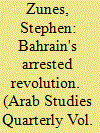

|
|
|
| 8 |
ID:
144291
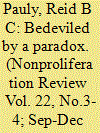

|
|
|
|
|
| Summary/Abstract |
This article explores how two influential American policy makers—Paul Nitze and McGeorge Bundy—wrestled with the idea of a norm against the use of nuclear weapons. Existing scholarship has overlooked how both Bundy and Nitze came to understand the idea of nuclear non-use, especially related to the credibility of threats to use nuclear weapons. Using documentary evidence from their personal papers, this article illuminates the thinking of Bundy and Nitze, finding that both engaged with the idea of a norm of non-use of nuclear weapons in their strategic writing and thought.
|
|
|
|
|
|
|
|
|
|
|
|
|
|
|
|
| 9 |
ID:
091963
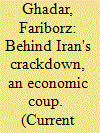

|
|
|
|
|
| Publication |
2009.
|
| Summary/Abstract |
Iran's election fraud last June, the civil unrest that followed, and the regime's continuing crackdown against dissenters have their roots in the country's poor economic condition. They are also rooted in efforts by President Mahmoud Ahmadinejad and his allies in the Islamic Revolutionary Guards Corps to grab control over large swaths of the economy.
|
|
|
|
|
|
|
|
|
|
|
|
|
|
|
|
| 10 |
ID:
124410
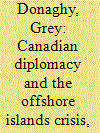

|
|
|
|
|
| Publication |
2013.
|
| Summary/Abstract |
In September 1954 forces from the People's Republic of China began shelling Chinese Nationalist positions on the tiny offshore islands that lay between the mainland and Formosa (present-day Taiwan). The outsized US response to this routine harassment sparked a Cold War confrontation that soon threatened to escalate out of control. This paper explores Canada's stake in that crisis. It follows Ottawa's early reaction to the events in the straits and traces foreign minister Lester B. Pearson's mediatory efforts to promote negotiations and a peaceful settlement. Pearson's liberal internationalist impulses, the paper argues, were always balanced and shaped by a realist calculation of where Canada's national interest lay. His doubts about the wisdom of US policy and his commitment to allied unity ensured that he beat a dignified retreat when the circumstances for peacemaking proved unpropitious.
|
|
|
|
|
|
|
|
|
|
|
|
|
|
|
|
| 11 |
ID:
109494
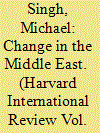

|
|
|
| 12 |
ID:
112471
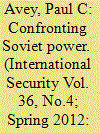

|
|
|
|
|
| Publication |
2012.
|
| Summary/Abstract |
Many self-identified realist, liberal, and constructivist scholars contend that ideology played a critical role in generating and shaping the United States' decision to confront the Soviet Union in the early Cold War. A close look at the history reveals that these ideological arguments fail to explain key aspects of U.S. policy. Contrary to ideological explanations, the United States initially sought to cooperate with the Soviet Union, did not initially pressure communist groups outside the Soviet orbit, and later sought to engage communist groups that promised to undermine Soviet power. The U.S. decision to confront the Soviets stemmed instead from the distribution of power. U.S. policy shifted toward a confrontational approach as the balance of power in Eurasia tilted in favor of the Soviet Union. In addition, U.S. leaders tended to think and act in a manner consistent with balance of power logic. The primacy of power over ideology in U.S. policymaking-given the strong liberal tradition in the United States and the large differences between U.S. and Soviet ideology-suggests that relative power concerns are the most important factors in generating and shaping confrontational foreign policies.
|
|
|
|
|
|
|
|
|
|
|
|
|
|
|
|
| 13 |
ID:
142339
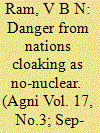

|
|
|
| 14 |
ID:
115322
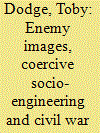

|
|
|
|
|
| Publication |
2012.
|
| Summary/Abstract |
Previous attempts to explain US policy towards Iraq from 2003 onwards have understood US intentions and actions through a coherent, rational-utility-maximizing model of the state. This article seeks to de-centre this rationalist explanation by examining the ideational drivers that shaped the Bush administration's understanding of Iraq and hence its policy towards the remaking of its post-invasion politics. In order to gain ideational coherence, both the Iraqi Ba'ath Party and the Sunni community were understood through a 'diabolical enemy image' schema. As a consequence, an 'exclusive elite pact' was constructed, a post-war political system specifically built to exclude former members of the Ba'ath Party and marginalize the participation of the Sunni community. This policy of exclusion drove the country into civil war. One side, Iraq's new ruling elite, fought to impose a victor's peace, the violent suppression of former members of the old regime. On the other, those excluded launched an insurgency to overturn the post-war political order.
|
|
|
|
|
|
|
|
|
|
|
|
|
|
|
|
| 15 |
ID:
156737


|
|
|
| 16 |
ID:
090484
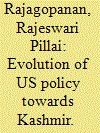

|
|
|
|
|
| Publication |
2009.
|
| Summary/Abstract |
The American policy towards Kashmir dispute has been inconsistent: from active efforts to resolve the dispute in the 1950s and 1960s, to benign neglect in the 1970s, to a more proactive approach during the early Clinton peiod, to a more nuanced but hands-off approach subsequently. The US policy on Kashmir has changed because the US approach in Kashmir has changed, from attempting to solve the complicated dispute, a broad approach, to ensuring that the conflict over Kashmir does not lead to instability and war in the region, a more narrow approach.
|
|
|
|
|
|
|
|
|
|
|
|
|
|
|
|
| 17 |
ID:
100481
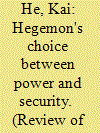

|
|
|
|
|
| Publication |
2010.
|
| Summary/Abstract |
After the Cold War, US strategists have suggested four strategies for the hegemon: hegemonic dominion, selective engagement, offshore balancing, and multilateralism. Rather than debating which strategy is the best for the US at all times, this article focuses on examining which policy is more likely to be chosen by the hegemon - the US - under different strategic conditions. Through a neoclassical realist argument - the power-perception hegemonic model, I argue that US foreign policy depends on how US policymakers perceive US hegemonic status in the international system. Under rising and stable hegemony, selective engagement and hegemonic dominion are two possible power-maximisation strategies given the weak security constraints from the system. Under declining hegemony, offshore balancing and multilateralism are more likely to be chosen by US policymakers to pursue security because of a resumed security imperative from anarchy. US policy toward Asia after the Cold War is a case study to test the validity of the power-perception hegemonic model. I conclude that US policymakers should prepare for life after Pax-Americana, and early implementation of offshore balancing and multilateralism may facilitate the soft-landing of declining US hegemony.
|
|
|
|
|
|
|
|
|
|
|
|
|
|
|
|
| 18 |
ID:
138099
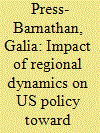

|
|
|
|
|
| Summary/Abstract |
This paper examines American policy regarding regional security arrangements (RSAs) in Asia. It argues that it is American perceptions of regional interest in such RSAs and of the compatibility of the goals of regional partners with those of the United States, which eventually shape American policy. After discussing the potential value and cost of RSAs, it suggests that actual policy choices are shaped largely as a reaction to regional states’ motivations and policies. Since in Asia, there was limited functional pooling effect to be gained from RSAs, changes in American policies reflected much more a reaction to changes in regional interest in such arrangements. This interaction is demonstrated through a review of post-Cold War developments regarding US RSA policy, distinguishing between the early years of transition to unipolarity and the erosion of unipolarity since the late 1990s. These are also compared to earlier American policy regarding RSAs during the Cold War.
|
|
|
|
|
|
|
|
|
|
|
|
|
|
|
|
| 19 |
ID:
124884
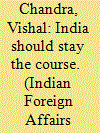

|
|
|
|
|
| Publication |
2013.
|
| Summary/Abstract |
As the Afghan war is far from over, India must take a long-term view of developments in its turbulent north-western neighbourhood. Based on certain assumptions about the likely course of the Afghan war, it is often argued that India may soon have to revisit its policies and priorities in Afghanistan. However, given the constraints and prevailing uncertainty, India may not be in a position to bring about any radical shift in its Afghan policy, at least not in the short-term. The Afghan situation is extremely fragile at the moment in view of the fragmented nature of its polity, overlapping transitions, and strong external dimensions to the conflict, all of which do have a direct impact on India's security and, at the same time, restrict its options.
|
|
|
|
|
|
|
|
|
|
|
|
|
|
|
|
| 20 |
ID:
179831
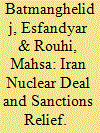

|
|
|
|
|
| Summary/Abstract |
To maximise the effectiveness of sanctions relief, the US must better ensure that lifting sanctions leads to substantial economic improvement.
|
|
|
|
|
|
|
|
|
|
|
|
|
|
|
|
|
|
|
|
|